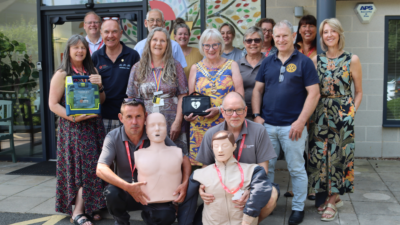
Treetops staff learn life-saving skills
Treetops Hospice is upskilling all its staff, from nurses to fundraisers, with essential life-saving skills, including CPR (cardiopulmonary resuscitation) and defibrillator use, through Basic Life Saving (BLS) training.
The hospice, based in Risley, Derbyshire, welcomes hundreds of people through its doors every year. The rollout of the vital BLS training programme reflects the simple truth that anyone, anywhere, can face a medical emergency.
Knowing what to do in those first few moments after a cardiac arrest can make all the difference, as Phil Shreeve, Director of Clinical Services, explained.
“Just because we provide end-of-life care doesn’t mean we ignore medical emergencies. We have a lot of people on site, including patients, families and carers, staff and volunteers, and even the general public who can walk around our grounds.
“You never know when someone might need urgent help. We want everyone who steps through our doors to feel that they’re in safe hands. “Being ready to act in a crisis is just another way of being there for the people who need us the most.”
Treetops staff will also take their new skills out and about in their daily lives, with even more wide-reaching effect in the local community.
Funding for the life-saving equipment was made possible through the efforts of Treetops supporter Paul Wilcox, affectionately known as 'Pushbike Paul.' In 2019, he launched a charity bike recycling scheme that collects donated bikes from the local community, refurbishes them to be roadworthy, and sells them in exchange for donations to the hospice. Additional funding support was generously provided by the Rotary Club of Long Eaton and the Church Wilne Rotary Satellite.
Read More 










